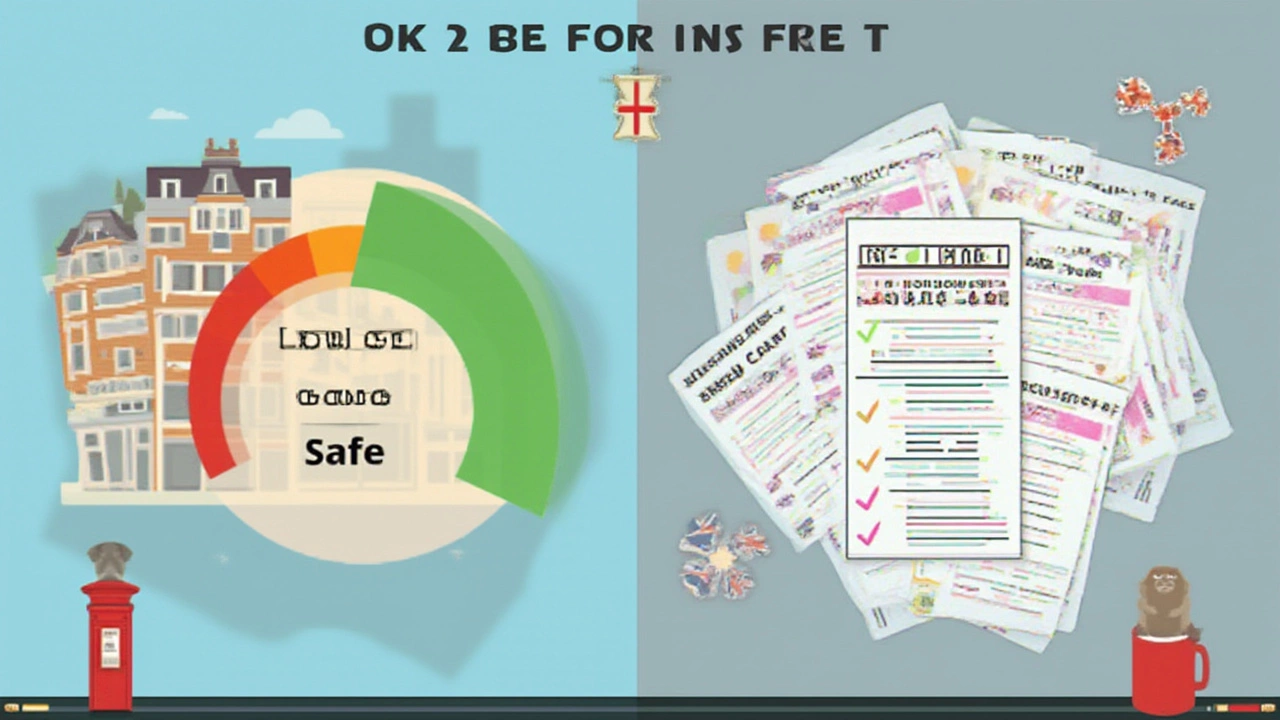Do Home Insurance Quotes Affect Your Credit Score? What You Need to Know
 Jul, 16 2025
Jul, 16 2025
Imagine clicking that "Get a Quote" button for home insurance, only to pause. You hesitate because, somewhere between online forms and phone calls, you’ve heard a rumor: asking for an insurance quote could ding your credit. And let’s be real, if you’ve spent months bumping up that score, the last thing you want is to lose points just for doing your homework. This worry isn’t just yours; it’s up there with wondering if checking your own credit report causes problems.
More people are shopping for home insurance than ever, snagging quotes online, over the phone, or even through their phone apps while waiting for coffee. But does chasing the best deal really come with hidden credit score costs? The truth is, the answer is both more comforting and more interesting than you might think. Grab a drink, get cozy, and let’s unpack all the details about how home insurance quotes and credit scores interact, what the difference is between a soft check and a hard inquiry, and how you can compare rates without breaking a sweat (or your credit).
How Insurers Use Your Credit—And Why It Matters
You might be surprised to learn that almost every major home insurer in the U.S. uses some kind of credit information when they calculate your quote. It’s not about judging your character or poking around your personal life—it’s a statistical thing. Over the years, insurance companies figured out there’s a connection between credit profile and risk—people with high credit scores tend to file fewer or less expensive claims. That’s why they include something called an "insurance credit score" in their rate equation.
But let’s clear up one massive source of confusion: home insurance quotes don’t involve a hard credit inquiry. Instead, most insurers run what’s called a "soft pull," the same type of check you’d get if you looked at your score with a free credit monitoring app or got pre-approved for a credit card. A soft pull doesn't impact your credit score in any way. No points lost, no harm done, no alarms triggered in your credit file. Soft pulls are invisible to lenders, banks, or future landlords checking your score.
This isn’t just speculation. The big three U.S. credit bureaus—Experian, Equifax, and TransUnion—all confirm that insurance inquiries are coded as soft inquiries, which have zero impact on your credit. There’s no record visible to others. It doesn't matter if you get quotes from three insurers or thirty; it doesn’t drag down your score.
Here’s a quick look at how this plays out in practice: if you ask for an insurance quote while rate shopping, you might see a note in your own credit report that an insurance company reviewed your file. But that’s there just for your records; nobody else sees it, and it doesn’t lower your number.
| Type of Credit Check | Who Uses It | Affects Your Score? | Visible to Others? |
|---|---|---|---|
| Soft Pull | Home insurance, pre-approvals, your own checks | No | No |
| Hard Inquiry | Credit cards, loans, mortgages | Yes | Yes |
This is really different from applying for a new credit card or a loan, where a hard inquiry pops up and might drop your score by a few points for months. So rest easy—your hunt for a home insurance quote won’t land your score in the doghouse.
Soft vs. Hard Pulls: Decoding Credit Language
If the terms "soft pull" and "hard inquiry" give you flashbacks to high school science class, you’re definitely not alone. Most people aren’t clear on what these mean or why they matter. But knowing the difference comes in handy, not just for insurance quotes but for pretty much anything money-related.
Soft pulls, sometimes called soft inquiries, happen when a company checks your credit for information without you officially applying for credit. Common examples: looking up your own score, being pre-approved for a credit card, or now, getting a home insurance quote. Soft pulls show up only to you and don’t count against your score. Even if you shop with a dozen insurance companies, none of them trigger a drop in your number.
Hard inquiries, though, are a different story. They happen when you actually apply for credit—think mortgages, car loans, or new credit cards. Hard pulls are visible to anyone checking your credit, and too many in a short time can suggest you’re desperate for money (even if you’re not). Each hard inquiry lowers your score by about 5 points, sometimes more or less. The sting fades after a year but can scare off lenders in the meantime.
Here's the kicker: insurance companies don’t need your written permission to run a soft pull for a quote, but they always tell you somewhere in the fine print. That’s why you might see language like, “We may review your credit information to determine your rate” on quote forms. Don’t worry—nothing happens without your go-ahead, and the process is fully aboveboard.
If you ever see a hard inquiry after getting a home insurance quote, something’s gone wrong. Maybe you applied for a special credit-linked product or accidentally asked for too much. If this happens, get in touch with the insurer and the credit bureau immediately. But for regular home insurance rate shopping, you’re safe: it’s all soft pulls, all the time.

Myths About Home Insurance Quotes and Your Credit Score
Rumors spread fast, especially on the internet where a single tweet can cause hundreds of folks to panic about their credit. When it comes to home insurance, you’ll find posts claiming that every quote costs you points, or that rate shopping looks shady to lenders. Time to put those stories to rest with some real-world facts.
Myth #1: Each insurance quote drops your credit score.
Truth: Only a hard inquiry can do that; insurance quotes don’t. Getting ten quotes, or even twenty, will not show up to banks or anyone else except you.
Myth #2: Insurers see your entire credit report and use it to make harsh decisions.
Truth: While insurers look at your credit score, they don't receive the full report lenders get. They receive a version designed to assess risk for insurance—not to decide if you get a loan. And the scoring model includes only what’s legal in your state. For example, in California, Maryland, and Massachusetts, insurance companies can’t use credit scores for homeowners insurance rates at all.
Myth #3: If you have bad credit, you can’t get home insurance.
Truth: You can always get home insurance. Your credit may bump up your premium, but you won’t be denied outright unless there are bigger issues, like unpaid claims or a history of insurance fraud.
Myth #4: Shopping for quotes makes you look desperate.
Reality: You should shop around—it’s the best way to save money. Insurance companies expect and even encourage it. Your credit stays untouched, and you’re more likely to snag discounts.
So don’t shy away from using comparison sites or reaching out to multiple agents. It’s smarter than sticking with the first quote you find. Serena and I once checked six different companies before locking in a policy for our new place, and the rates varied by almost $1,000 a year. No drama, no credit dip—just smart shopping.
How to Compare Home Insurance Quotes Without Hurting Your Credit
If you’re looking to score the best deal on home insurance, you want to cast a wide net. But how do you shop without risking your credit, or getting stuck with a thousand phone calls afterward?
- Use official, reputable platforms. Check the company site or established insurance marketplaces that clearly explain their process, so you know they only use soft pulls.
- Limit the information you provide online. Only give what’s necessary—usually your address, some details about the home, and maybe your birthday. Don’t hand out your social security number unless you’re 100% sure of the company’s legitimacy.
- Keep track of which companies you’ve contacted, so you remember where your info went and can spot any suspicious activity.
- Look for the fine print about credit checks. Most sites are upfront—if you don’t see this, move on.
- Avoid agents who promise deep discounts in exchange for more personal data than seems reasonable. If it feels off, trust your gut.
Want a pro tip? Knock out your quote shopping within a few days, so you can compare choices side by side while details are fresh. You’ll see big swings in rates for the same home, but your credit score will stay perfectly intact.
And once you pick a provider, ask them about all possible discounts. Some offer price cuts for bundling home and auto, having a security system, or even paying your bill automatically. Not all deals are advertised, so it pays to ask.
If you’re nervous about your credit in general, keep an eye on your reports. You can check them for free from all three national bureaus each week through the official government site. If you spot an error—a hard inquiry you never authorized, for instance—dispute it right away and keep documentation.

What Really Impacts Your Credit When Insurance Is Involved?
To recap, shopping for home insurance won’t impact your credit score—quotes are always soft pulls. But that doesn’t mean nothing in this process can ever touch your score.
The most common way insurance comes up on credit? If you finance your initial insurance premium through a third-party lender, which sometimes happens if you can’t pay the entire amount upfront. These premium finance contracts are loans, so applying for one can create a hard inquiry. But that’s different from just comparing insurance quotes.
Also, falling behind on your bill has consequences. If you don’t pay and your account goes to collections, that’s reported as a negative mark and can drag your score down by 50 points or more. Missed payments show up for up to seven years, causing headaches when you want a new loan, credit card, or even a job. So, keeping up with your insurance bill, just like your credit card, is crucial for keeping your score high.
Some insurance companies might let you pay monthly with no credit check, while others check your credit if you go for monthly billing over a big annual payment. So, before committing, ask how payments work and what the process is.
If your state doesn’t let insurers use credit history (like those three mentioned earlier), it won’t be a factor at all—a nice break if you live there. But for most Americans, credit is part of the game. Luckily, since quotes don’t cause hard pulls, you can freely compare rates, and then focus on paying on time once you sign up.
Some data breaks this all down. According to the National Association of Insurance Commissioners (NAIC), about 85% of U.S. insurers use credit information for setting premiums, but less than 1% of quote requests ever result in a hard inquiry—and those are mostly from specialty financing, not regular quotes. So your odds of accidental credit harm are almost zero if you’re just browsing options.
Bottom line: as long as you do your homework, stick to reputable insurers, and pay on time, your credit is safe. Don’t let fear of a myth stop you from saving hundreds—maybe even thousands—on your home insurance every year.
